📍 From My Latest Podcast Episode: A subscriber thought Jun-tae and his friends were actually Japanese transfer students when they started speaking Japanese! Today I’m diving into the otaku culture mystery plus the beautiful friendship dynamics between Jun-tae and Go-tak that had me smiling like a proud mom 😊
📢 Fair Use Notice
This post contains copyrighted material from “Weak Hero Class 2” (© Netflix) used for educational analysis, criticism, and commentary purposes under fair use doctrine. All rights belong to original creators.
The Japanese Language Mystery That Confused Everyone
🗾 You know what made me laugh? When a subscriber commented:
When they first started talking in Japanese, I thought that they were really Japanese. Like, you know, some people are transferred from another country to other country for school 🇯🇵
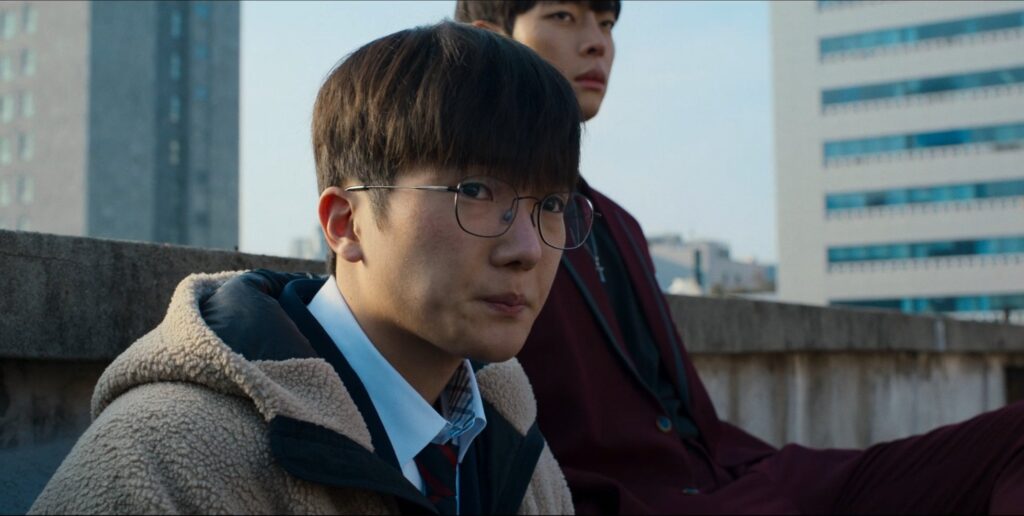
This confusion is totally understandable if you’re not familiar with Korean otaku culture! Let me break down exactly what’s happening in that scene and why it’s actually a brilliant cultural detail.
Understanding Otaku Culture in Korean Schools
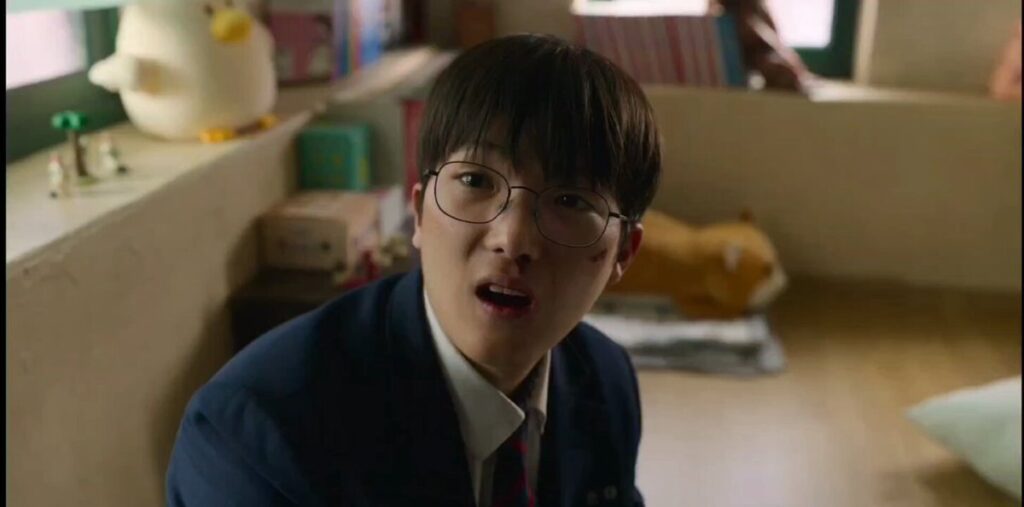
“Otaku” refers to hardcore enthusiasts completely obsessed with Japanese animation or manga. During my school days, I had friends so devoted to Japanese anime that they’d dress up as characters and attend cosplay festivals.
Unfortunately, back then, otaku culture was often dismissed as a “subculture for people who can’t distinguish between manga and reality.” This attitude naturally made otaku students perfect targets for bullies like Hyo-man.
Weak Hero brilliantly uses this real social dynamic to create authentic tension. The show doesn’t mock Jun-tae’s interests—instead, it examines how social prejudice creates unnecessary conflict.
Why Korean Students Actually Spoke Japanese

Jun-tae’s friend dramatically declaring ‘Someday I will take Choi Hyo-man’s breath with my blade’ in Japanese
The scene where Jun-tae’s friend dramatically declares in Japanese, “Someday I will take Choi Hyo-man’s breath with my blade,” 🗡️ isn’t random—it’s a comedic directorial choice showing how deeply these students are immersed in Japanese animation culture.
From my personal experience, many Korean otaku friends could hold basic conversations in Japanese. Learning Japanese is relatively easier for Koreans due to:
- Similar grammar structures
- Shared vocabulary
- Cultural proximity
As I shared with my subscribers:
Back in my school days, there was this otaku friend who was sleeping during class, and the teacher told me to wake her up. So I tapped her shoulder and said ‘the teacher wants you to wake up,’ and she responded in Japanese like ‘nani?’ (what?) and I just burst out laughing!
These linguistic crossovers were surprisingly common in Korean schools with dedicated anime fans.
The Beautiful Brotherhood: Jun-tae and Go-tak’s Friendship
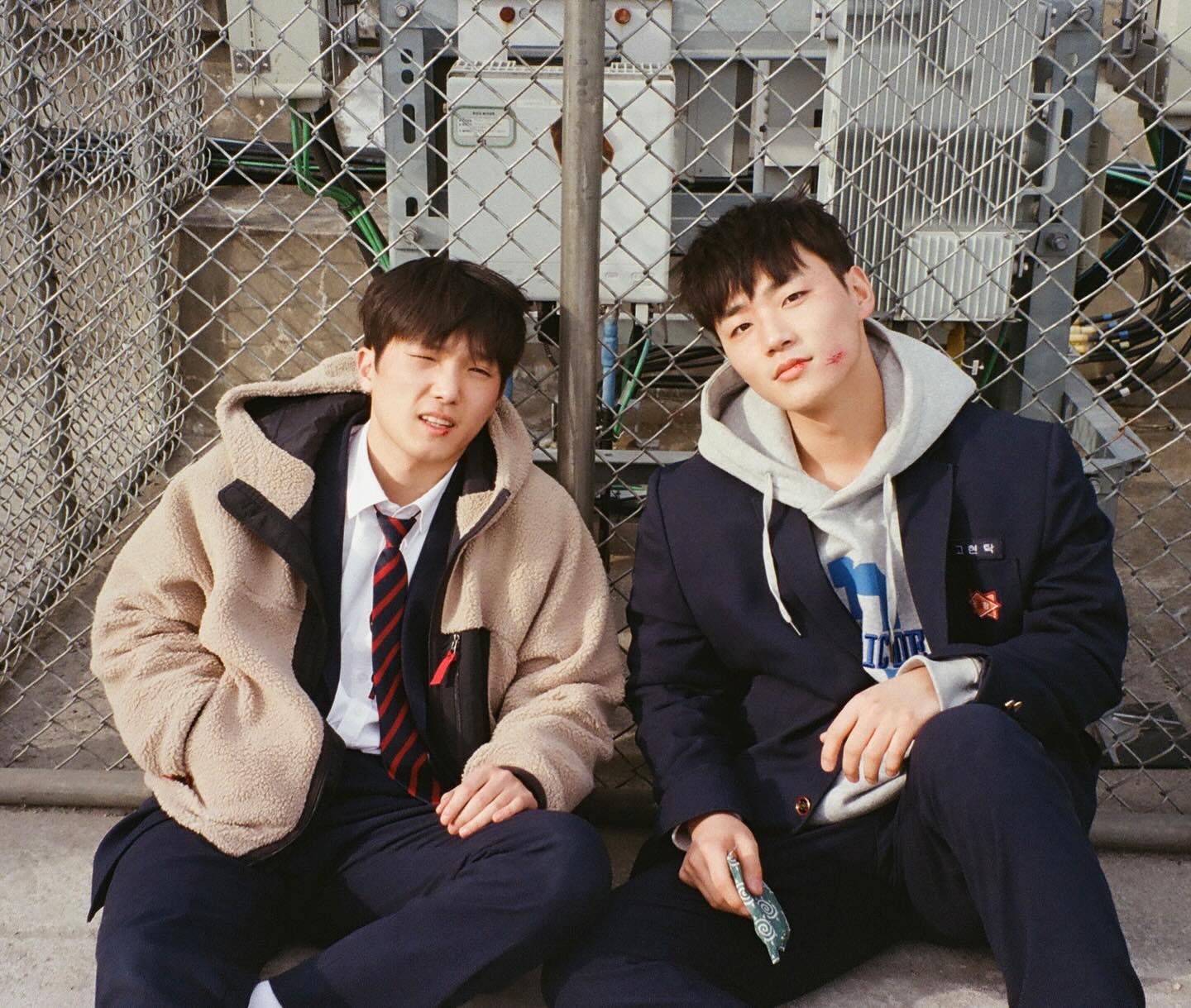
🤝 Beyond the Japanese language question, viewers have been deeply moved by these two characters’ friendship dynamics. Their relationship reveals fascinating aspects of Korean social culture that international audiences might miss.
The Secret Language of Korean Names and Nicknames
The way Jun-tae addresses his friend reveals everything about their closeness. Instead of using his full name “Go Hyeon-tak” or even his nickname “Go-tak,” Jun-tae calls him simply “Tak-ah.”
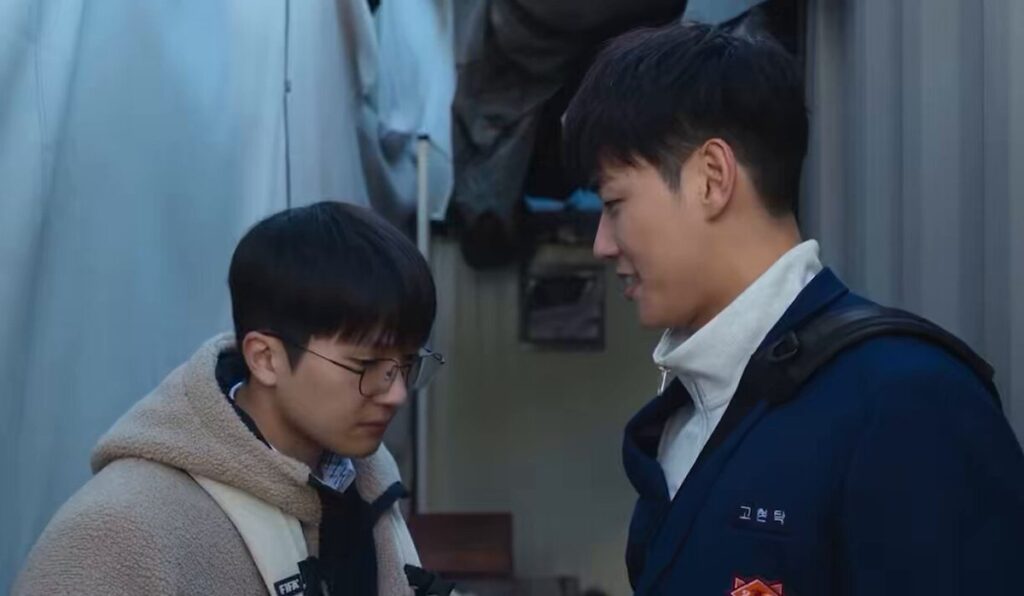
🇰🇷 In Korean culture, this naming convention carries deep meaning:
- Full names (like “Go Hyeon-tak”) suggest formal distance
- Nicknames (like “Go-tak”) show casual friendship
- Single syllables with affectionate particles (like “Tak-ah”) indicate intimate closeness
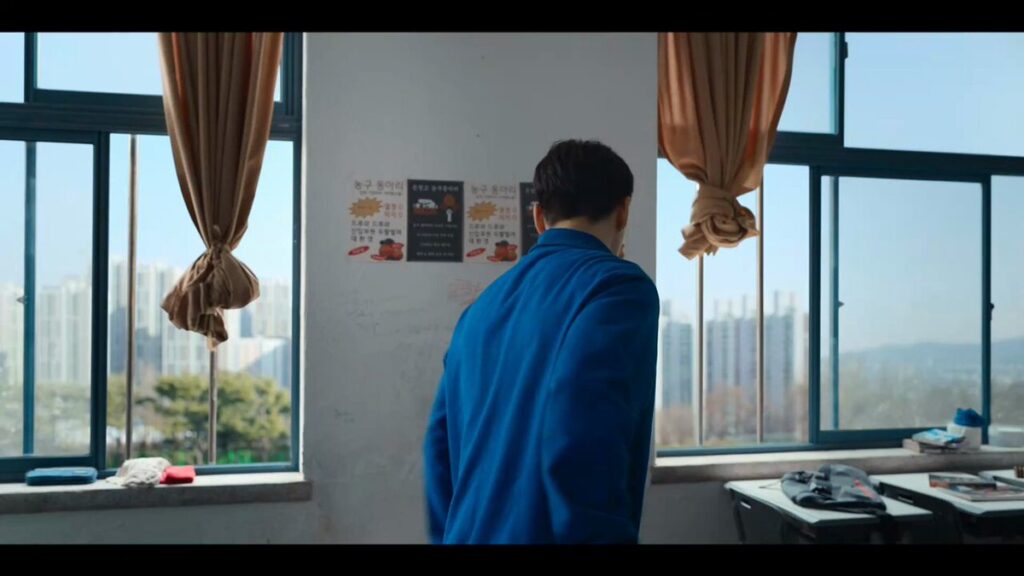
The contrast between formal address and intimate nicknames – Jun-tae’s otaku friend uses ‘Go Hyeon-tak’ while Jun-tae says ‘Tak-ah,’ showing their different relationship levels.
When Jun-tae tries to calm his angry friend by saying “Tak-ah, let’s think about this more carefully,” that simple name choice tells us everything about their bond.
Names ending in “Tak” are particularly prone to this shortened form because it’s comfortable and efficient for Korean speakers to pronounce. During my school days, there was a classmate named “Oh Min-tak,” and his close friends would call him “Tak-ah” just like Jun-tae does.
The Guardian Dynamic: Who’s Really Protecting Whom?
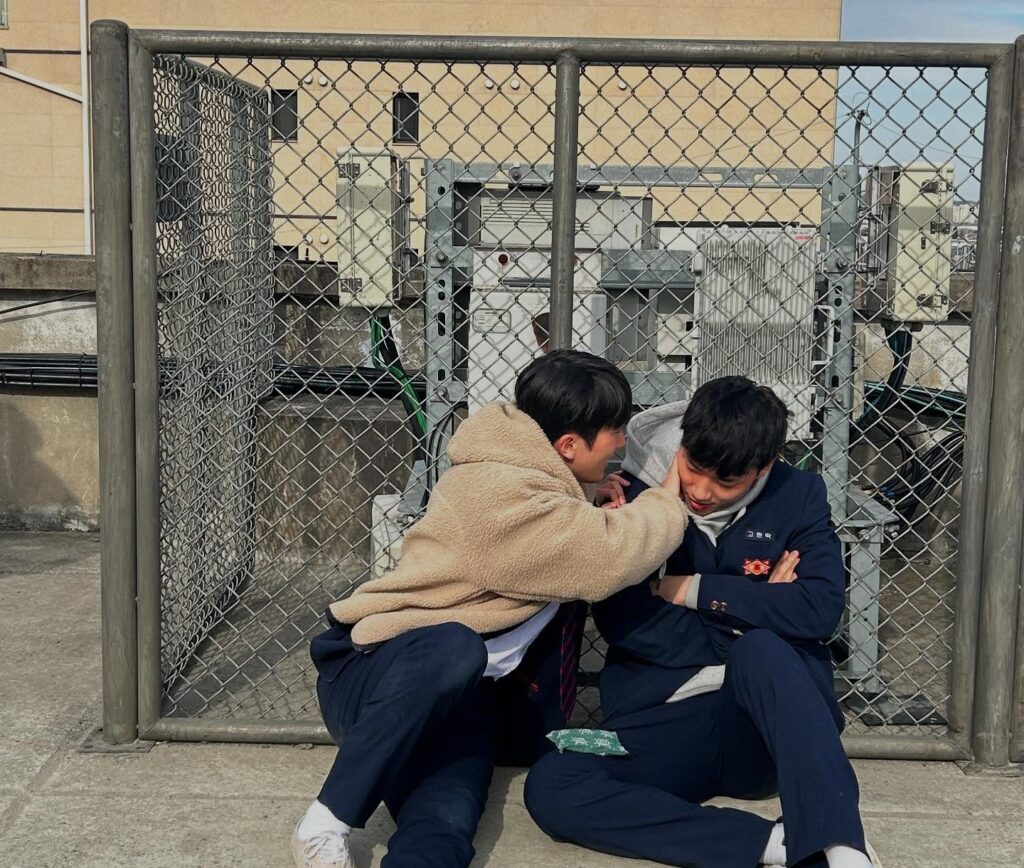
Jun-tae holding back his hot-tempered friend – showing how the smaller boy often serves as the emotional guardian for the physically stronger Go-tak
⚖️ At first glance, the tall, strong Go-tak appears to be the protector of smaller, bullied Jun-tae. But many viewers, including myself, see a more nuanced relationship where Jun-tae actually serves as Go-tak’s emotional guardian.
Here’s why Go-tak is different from Su-ho, despite surface similarities:
- Su-ho suppresses anger and deflects with humor when upset
- Go-tak is refreshingly honest with his emotions—when he’s angry, he acts on it immediately
I love Go-tak’s straightforward, hot-tempered nature. He’s like a healthy seventeen-year-old who’d rather play outside than study, someone who wears his heart on his sleeve.

Go-tak’s emotional honesty with Si-eun – ‘I have a lot to be sorry about and a lot to be grateful for’ – showing his straightforward, heart-on-sleeve personality.
Jun-tae consistently serves as Go-tak’s impulse control, like someone managing an enthusiastic large dog who’s prone to digging up the entire yard! 🐶😂 Their dynamic perfectly balances Go-tak’s passionate intensity with Jun-tae’s thoughtful restraint.
The Evolution of Otaku Culture in Korea
📈 It’s worth noting that Korean society’s attitude toward otaku culture has evolved significantly. What was once dismissed as antisocial behavior is now recognized as a legitimate cultural phenomenon.
This shift makes Weak Hero’s portrayal feel both:
- Historically accurate for its setting
- Progressive in its sympathetic treatment of these characters
The show doesn’t mock Jun-tae and his friends for their interests—instead, it examines how genuine friendship can survive even the most difficult social circumstances.
Why These Cultural Details Matter
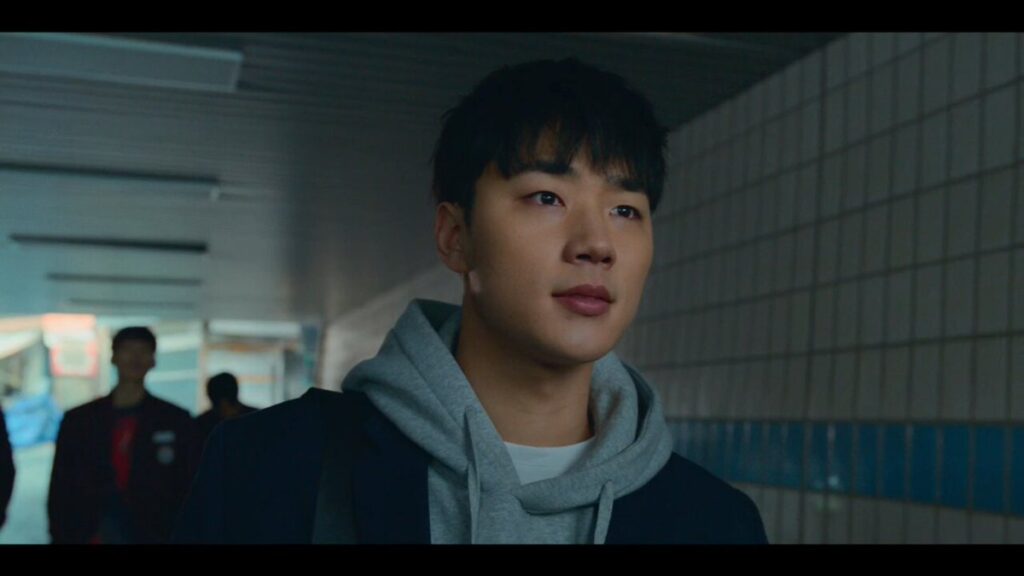
Jun-tae and Go-tak in a peaceful moment together – their friendship showcasing how different personality types can create perfect emotional compatibility.
🎯 Understanding these cultural nuances transforms how we view Jun-tae and Go-tak’s relationship. They’re not just convenient plot devices or comic relief—they represent real friendship patterns that Korean viewers instantly recognize.
Their bond showcases how different personality types can complement each other:
- Go-tak’s emotional honesty balances Jun-tae’s analytical nature 🔥
- Jun-tae’s thoughtfulness tempers Go-tak’s impulsiveness 💗
- Together, they create a friendship that feels both culturally specific and universally relatable 👍
Looking Forward: Why This Friendship Matters
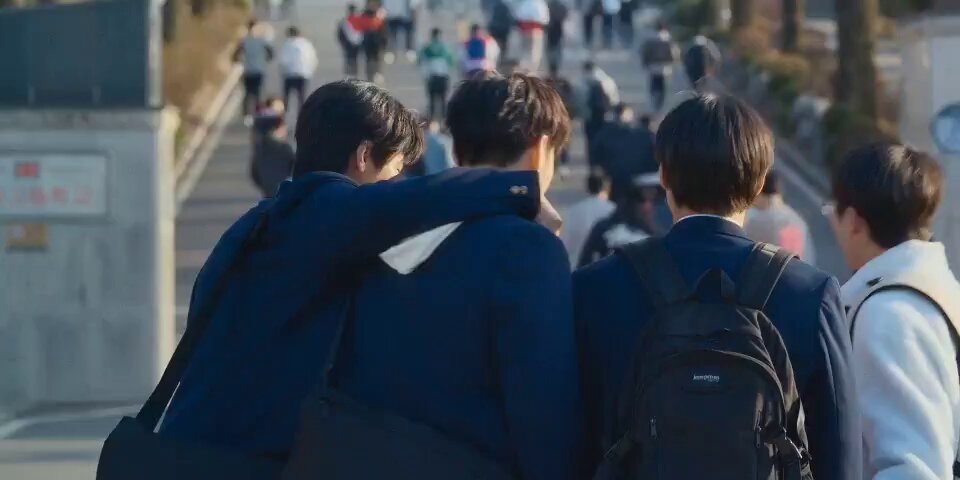
The protective instincts flowing in both directions – Jun-tae and Go-tak showing that the strongest friendships involve mutual care and understanding.
🔮 As Weak Hero continues to gain international recognition, these cultural details become increasingly important for understanding why the show resonates so deeply with Korean audiences.
Jun-tae and Go-tak’s friendship reminds us that some of the most meaningful relationships develop between people who seem mismatched on paper but find perfect emotional compatibility in practice.
Their story proves that even supporting characters can carry profound emotional weight when written with genuine understanding of the social worlds they inhabit.
Whether you’re drawn to their protective dynamic, their cultural authenticity, or simply their heartwarming loyalty to each other, Jun-tae and Go-tak represent some of Weak Hero’s finest character work.
💭 What Do You Think?
Have you noticed other cultural details in Weak Hero that international viewers might miss? Do you have similar friendship dynamics in your own culture? Share your thoughts in the comments below!
🔗 Related Posts by Character & Language
📚 Si-eun (시은) Analysis
English Posts
- Si-eun’s Episode 8 Revenge: Why the “Implausible” Critique Completely Misses the Point
- Why Si-eun is a Character Magnet: The Psychology Behind Weak Hero’s Most Compelling Relationships
- Si-eun’s Hidden Violence: An Exploration
- Si-eun’s Revenge Debate: Core Fan Comments Compilation
🥊 Su-ho (수호) Analysis
English Posts
- Su-ho’s Lost Comedy Gold: The Wordplay That Made Weak Hero Fans Fall in Love (But English Subtitles Missed Everything)
- The Untold Story of Su-ho and Beom-seok: Why Their Friendship Was Doomed from the Start
Korean Posts
💔 Beom-seok (범석) Analysis
English Posts
- When Dreams Become Prison: Analyzing Beom-seok’s Boxing Ring Appearance in Si-eun’s Dreams
- When Subscribers Become Psychology Experts: Two Brilliant Takes on Why Beom-seok Destroyed Su-ho in That Ring
- Beom-seok’s Obsession with Su-ho: The Tragic Psychology Behind Weak Hero’s Most Complex Relationship
⚡ Seong-je (성제) Analysis
English Posts
🤝 Character Dynamics
English Posts
- Su-ho and Si-eun’s Relationship: When Fans Ask the Hard Questions About Weak Hero’s Most Debated Bond
- Understanding Yeong-i: The Character Who Reveals Everything About Weak Hero’s Heart
- Was Yeong-i Added to Tone Down the Bromance? When Subscribers Drop Literary Masterpieces in My Comments
- Jun-tae’s Japanese Mystery and the Heartwarming Go-tak Friendship in Weak Hero Class 2
🎭 Behind-the-Scenes & Analysis
English Posts
- Weak Hero Class 1 Script Book: Behind-the-Scenes Secrets That Will Change How You See the Show
- Script Book vs Final Cut: The Dream Scene That Made Us All Cry
- The Complete Behind-the-Scenes Story of Weak Hero Class 1 – Answering Subscriber Questions
- Weak Hero Class Change Video Explanation: Actors Switching Roles
- Weak Hero Deleted Scene Delivery! Beuksan High’s #1 Taking Down Bullies
🌍 Fan Community & Cultural Analysis
English Posts
- Weak Hero Fans Are Going INSANE and I’m Here for It: The Comments That Broke My Brain
- The Joy of Global Connection: Discussing Weak Hero’s Most Complex Relationships with Fans Around the World
- When International Fans Decode Korean Bromance: Why Weak Hero Reads as BL Overseas
- Three Questions That Reveal Weak Hero’s Hidden Korean Realism
- Why These Three Friends Always Sit Together During Exams (And Other Translation Secrets)
Korean Posts
📊 Quick Navigation by Interest
⚡ Character Dynamics:
- Su-ho and Si-eun’s Relationship
- Beom-seok’s Obsession with Su-ho
- When International Fans Decode Korean Bromance
🧠 Psychology Deep Dives:
- When Subscribers Become Psychology Experts
- Si-eun’s Episode 8 Revenge
- Why Si-eun is a Character Magnet
🎬 Behind-the-Scenes Content:
🌐 Translation & Cultural Context:
⚠️ Site Policies & Legal Information
✅ About JennieKdrama.com: This blog provides personal fan analysis and reviews of K-dramas, focusing on school action series like ‘Weak Hero.’ All content represents personal opinions and interpretations from a fan perspective, unaffiliated with official production teams.
⛔️ Copyright Disclaimer: All drama footage, images, and references belong to their respective copyright holders, including streaming platforms and original creators. Materials are used minimally for educational criticism and analysis without intent of copyright infringement.
🚫 Privacy Policy: This site follows standard web policies and does not directly collect personal information beyond basic analytics for content improvement. Cookies may be used to enhance user experience and advertisements may be displayed.
답글 남기기